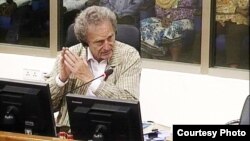PHNOM PENH - British historian and Pol Pot biographer Philip Short continued his testimony at the UN-backed Khmer Rouge tribunal on Thursday, describing the downfall of the regime and some of the underlying causes of its brutality.
Short is testifying in the case against two former leaders—ideologue Nuon Chea and head of state Khieu Samphan—both of whom are charged with atrocity crimes, including genocide.
Short’s testimony over the past four days has highlighted weaknesses of the regime and given historical and geopolitical perspective to the trial.
“The fundamental reason for the failure of the revolution was its single-mindedness,” Short told the court Thursday. “The fact is that it was carried out without any consideration of the suffering that it engendered.”
Policies were undertaken “incompetently” by a cadre of peasants, he said. That’s because the Cambodian revolutionaries had learned from China that it was “better to be red than expert,” he said, and so technical expertise was often overlooked for revolutionary loyalty.
Those factors were added to the pressures of “a perceived threat from Vietnam” which added to the strains on the regime, he said. “But fundamentally the problem was what I’ve called the cruel, inhumane and abominable way in which good policies were put into effect and became not just bad but appalling.”
Short is testifying in the case against two former leaders—ideologue Nuon Chea and head of state Khieu Samphan—both of whom are charged with atrocity crimes, including genocide.
Short’s testimony over the past four days has highlighted weaknesses of the regime and given historical and geopolitical perspective to the trial.
“The fundamental reason for the failure of the revolution was its single-mindedness,” Short told the court Thursday. “The fact is that it was carried out without any consideration of the suffering that it engendered.”
Policies were undertaken “incompetently” by a cadre of peasants, he said. That’s because the Cambodian revolutionaries had learned from China that it was “better to be red than expert,” he said, and so technical expertise was often overlooked for revolutionary loyalty.
Those factors were added to the pressures of “a perceived threat from Vietnam” which added to the strains on the regime, he said. “But fundamentally the problem was what I’ve called the cruel, inhumane and abominable way in which good policies were put into effect and became not just bad but appalling.”







